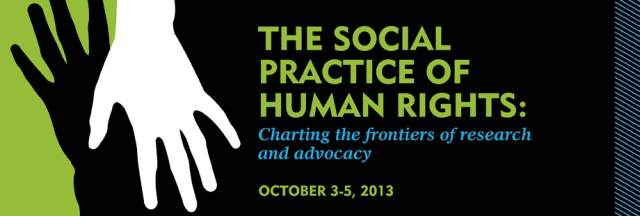Popular Perceptions of Human Rights Issues and Organizations
Location
River Campus - Room M2060
Start Date
10-4-2013 3:15 PM
Abstract
Different populations have different perceptions of human rights organizations. For some, rights groups are political and social justice heroes battling the forces of repression, corruption, and abuse. For others, however, rights groups are defenders of terrorists, criminals, and pro-Western elites, or Trojan horses for foreign values. Drawing on key informant interviews with human rights practitioners from 60 countries (n=235) and original opinion surveys in Mexico, Brazil, Colombia, India, and Morocco (n=8400), we explore 1) the extent to which human rights discourse has permeated each of these societies and, more importantly 2) determinants of attitudes toward human rights, especially popular trust in international and domestic human rights groups. These determinants include national context, socio-economic status, religiosity, urban or rural residence, and political and ideological leanings. We expect that some relationships will hold across all countries. Exposure to the term “human rights”, familiarity with rights-based organizations (RBOs), knowing RBO workers, and participation in human rights organizations should be a largely urban phenomena more prevalent among more educated, higher earning respondents. More religious, lower income, and rural respondents—as well as those who believe RBOs are foreign-backed—will, we believe, trust RBOs less than their higher earning, secular, and urban counterparts. Lower income, less educated, and rural respondents may perceive RBOs as ineffective and elitist. Finally, adherents to religions other than Christianity (including Muslims, Hindus, and Buddhists) could perceive the concept of human rights as a fundamentally foreign, Western idea. We also have some specific expectations about attitudes toward human rights within, and between, countries. Given governmental efforts to promote human rights and creation of a national human rights commission, we expect Moroccans to trust RBOs more than Indian and Mexican respondents, and will be less likely than the latter to believe that RBOs get their funds from foreign sources. Epidemic violence and crime might lead Mexicans to associate human rights with protecting criminals, while struggles between government and armed insurgents may incline Colombians to associate human rights with protecting terrorists. Qualitative evidence, in-country experience, and the 2008 Mumbai bombings (made newly salient after the recent hanging of a Pakistani perpetrator) lead us to believe that Indians will also link human rights to coddling terrorism. In addition, given intermittent violence against religious minorities, Christians and, especially, Muslims should trust RBOs more than Hindus, particularly higher-caste ones.
Popular Perceptions of Human Rights Issues and Organizations
River Campus - Room M2060
Different populations have different perceptions of human rights organizations. For some, rights groups are political and social justice heroes battling the forces of repression, corruption, and abuse. For others, however, rights groups are defenders of terrorists, criminals, and pro-Western elites, or Trojan horses for foreign values. Drawing on key informant interviews with human rights practitioners from 60 countries (n=235) and original opinion surveys in Mexico, Brazil, Colombia, India, and Morocco (n=8400), we explore 1) the extent to which human rights discourse has permeated each of these societies and, more importantly 2) determinants of attitudes toward human rights, especially popular trust in international and domestic human rights groups. These determinants include national context, socio-economic status, religiosity, urban or rural residence, and political and ideological leanings. We expect that some relationships will hold across all countries. Exposure to the term “human rights”, familiarity with rights-based organizations (RBOs), knowing RBO workers, and participation in human rights organizations should be a largely urban phenomena more prevalent among more educated, higher earning respondents. More religious, lower income, and rural respondents—as well as those who believe RBOs are foreign-backed—will, we believe, trust RBOs less than their higher earning, secular, and urban counterparts. Lower income, less educated, and rural respondents may perceive RBOs as ineffective and elitist. Finally, adherents to religions other than Christianity (including Muslims, Hindus, and Buddhists) could perceive the concept of human rights as a fundamentally foreign, Western idea. We also have some specific expectations about attitudes toward human rights within, and between, countries. Given governmental efforts to promote human rights and creation of a national human rights commission, we expect Moroccans to trust RBOs more than Indian and Mexican respondents, and will be less likely than the latter to believe that RBOs get their funds from foreign sources. Epidemic violence and crime might lead Mexicans to associate human rights with protecting criminals, while struggles between government and armed insurgents may incline Colombians to associate human rights with protecting terrorists. Qualitative evidence, in-country experience, and the 2008 Mumbai bombings (made newly salient after the recent hanging of a Pakistani perpetrator) lead us to believe that Indians will also link human rights to coddling terrorism. In addition, given intermittent violence against religious minorities, Christians and, especially, Muslims should trust RBOs more than Hindus, particularly higher-caste ones.




Comments
This biennial conference provides a unique space for scholars, practitioners and advocates to engage in collaboration, dialogue and critical analysis of human rights advocacy — locally and globally. Learn more about the Human Rights Center at the University of Dayton >>>.